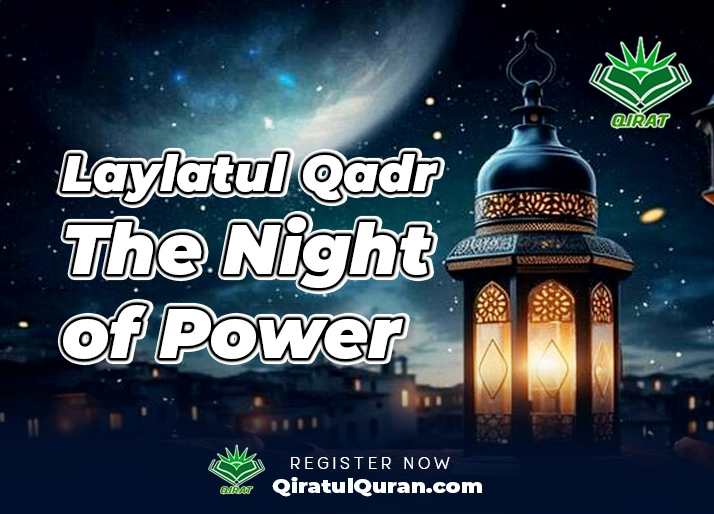
What happens at the Laylatul Qadr?
Laylatul Qadr the Night of Power, is highly significant in the Islamic faith. It is believed that on this night, the first verses of the Qur’an were revealed to Prophet Muhammad (peace be upon him) by Allah through the angel Jibreel (Gabriel). This holy night marks the beginning of the divine revelation that would eventually become the complete Qur’an, the sacred scripture of Islam.
Which night is Laylatul Qadr?
Laylatul Qadr the night of Power falls within the last ten nights of the month of Ramadan, the ninth month of the Islamic calendar. While the exact date varies each year, it is typically observed on one of the odd-numbered nights during the last ten days of Ramadan. The most commonly accepted view is that Laylatul Qadr falls on the 27th night of Ramadan.
What to do on the 27th night of Ramadan?
Muslims around the world devote the 27th night of Ramadan to intense worship, supplication, and seeking forgiveness from Allah. This night is considered to be better than a thousand months (approximately 83 years) of worship. Believers gather in mosques or their homes to perform special night prayers (Qiyam al-Layl) and recite the Qur’an. It is a time for deep contemplation, repentance, and seeking Allah’s mercy and blessings.
Do Sunnis do Laylat al-Qadr?
Yes, both Sunni and Shia Muslims observe Laylat al-Qadr with great reverence and devotion. While there may be minor differences in the specific practices and interpretations between the two sects, the essence of the night’s significance is universally recognized and celebrated by all Muslims.
What is the reward of praying on Laylat al-Qadr?
According to the Qur’an (chapter 97, verse 3), the reward for worship and prayers performed on Laylatul Qadr is greater than that of a thousand months of worship. This emphasizes the immense spiritual value and blessings associated with this night. Engaging in sincere worship and supplication on this night is believed to lead to the forgiveness of sins and the attainment of Allah’s pleasure.
How many Rakats are there in Laylatul Qadr?
There is no specific number of Rakats (units of prayer) prescribed for the night of Laylatul Qadr. The focus is on spending the night in worship and supplication, with many Muslims performing additional voluntary prayers (Nawafil) beyond the obligatory five daily prayers. Some Muslims may perform as many as 20 Rakats or more, divided into multiple sets of two or four Rakats, with recitations from the Qur’an and supplications in between.
How do you spend the night of Laylatul Qadr?
Muslims strive to spend the night of Laylatul Qadr in a state of constant remembrance of Allah. This includes performing voluntary prayers (Nawafil), reciting the Qur’an, engaging in dhikr (remembrance of Allah through words and meditation), making sincere supplications (dua), seeking forgiveness (istighfar), and reflecting on one’s spiritual journey and relationship with Allah.
What dua is said during Laylatul Qadr?
While there is no specific dua (supplication) prescribed for Laylatul Qadr, Muslims often recite various supplications from the Qur’an and hadith (sayings of Prophet Muhammad S.A.W). Some commonly recited duas include:
- “Allahumma innaka ‘afuwwun, tuhibbul ‘afwa, fa’fu ‘anni” (O Allah, You are the One who pardons greatly, and You love to pardon, so pardon me).
- “Rabbighfirli wa li-waalidayya wa lilmu’mineena yawma yaquumul-hisaab” (O Lord, forgive me, my parents, and all the believers on the Day of Judgment).
- “Rabbanaa aatinaa fiddunya hasanatan wa fil-aakhirati hasanatan wa qinaa ‘adhaaban-naar” (Our Lord, grant us good in this world and good in the Hereafter, and save us from the punishment of the Fire).
How to pray on Laylatul Qadr night at home?
Muslims can observe Laylatul Qadr at home by performing voluntary prayers, reciting the Qur’an, engaging in dhikr, and making supplications. Here are some steps to follow:
- Make sincere intentions to observe Laylatul Qadr with utmost devotion.
- Perform ablution (wudu) and prepare a clean, peaceful place for worship.
- Offer voluntary prayers (Nawafil) in sets of two or four Rakats, with recitations from the Qur’an and supplications in between.
- Recite the Qur’an with understanding and reflection.
- Engage in dhikr by reciting phrases like “Subhan Allah” (Glory be to Allah), “Alhamdulillah” (Praise be to Allah), “Allahu Akbar” (Allah is the Greatest), and “La ilaha illallah” (There is no deity worthy of worship except Allah).
- Make sincere supplications (dua) for forgiveness, guidance, blessings, and the well-being of oneself, family, and the entire Muslim community.
- Seek forgiveness from Allah (istighfar) for any shortcomings or sins.
- Reflect on one’s relationship with Allah and make firm resolutions for spiritual self-improvement.
What to do on Laylatul Qadr step by step?
Here are step-by-step instructions for observing Laylatul Qadr:
- Purify yourself by performing ablution (wudu) and wearing clean, modest clothing.
- Perform the obligatory Isha prayer (the night prayer) and proceed to the mosque or prepare a clean space at home for worship.
- Offer voluntary prayers (Nawafil) in sets of two or four Rakats, with recitations from the Qur’an and supplications in between.
- Recite the Qur’an with understanding, reflection, and reverence. Focus on chapters and verses that emphasize forgiveness, mercy, and repentance.
- Engage in dhikr (remembrance of Allah) by reciting phrases like “Subhan Allah,” “Alhamdulillah,” “Allahu Akbar,” and “La ilaha illallah.”
- Make sincere supplications (dua) for forgiveness, guidance, blessings, and the well-being of oneself, family, and the entire Muslim community.
- Seek forgiveness from Allah (istighfar) for any shortcomings or sins.
- Reflect on one’s relationship with Allah and make firm resolutions for spiritual self-improvement.
- Maintain a state of calmness, humility, and concentration throughout the night, avoiding idle talk or distractions.
- Continue the worship, recitation, and supplication until the dawn (Fajr) prayer.
Can you make any dua on Laylatul Qadr?
Yes, on the Night of Power, Muslims are encouraged to make sincere and heartfelt supplications (dua) to Allah, asking for forgiveness, guidance, blessings, and the fulfillment of their righteous desires. Laylatul Qadr is a time when Allah is particularly close to His servants, and supplications are more likely to be accepted.
Conclusion
Laylatul Qadr the Night of Power, holds immense spiritual significance for Muslims worldwide. It is a time to seek forgiveness, engage in worship, recite the Qur’an, and make sincere supplications to Allah. By observing this sacred night with devotion and sincerity. Muslims strive to attain the blessings and rewards promised by Allah. ultimately strengthening their faith and relationship with their Creator.
Note: To Learn Quran Online Look into our Online Quran courses.






Pingback: Quran Verses About Ramadan | What Quran Says About Ramadan